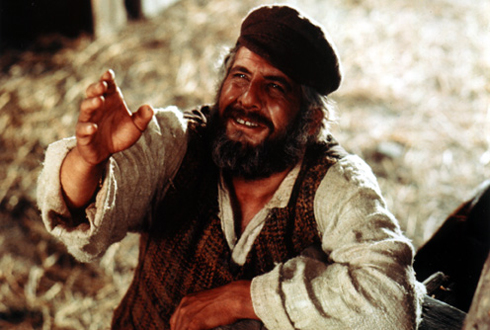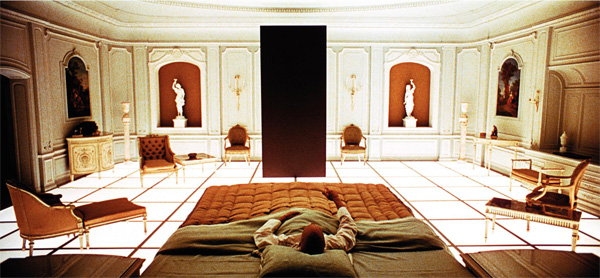Several years ago, inspired by Doug
Walker’s list of his 20 favorite movies (also in two parts), I came up with a
list of my own 20 favorite movies. After
recently rereading the list (and since I have not yet had the chance to see 42 or any of the tiny handful of other
interesting films out thus far this year), I realized that, while some films’
spots on the list remain immutable and fixed, some no longer held the same
esteem in my eyes. Others I adored even
more than I did when I made the list.
And still other films, ones that I had not seen at the time, have since
then wormed their way into the warmest cockles of my heart. The only movies that were not eligible for
consideration were films I have seen in the past year, since I usually need
some time to distance from myself from the first viewing before I can
rightfully call a film a “favorite” (meaning movies like Lincoln, Cloud Atlas, and
Moonrise Kingdom, which could very
well be on a future version of this list, will not be making appearances just
yet).
With that, I present to you my
revised list of my Top 20 favorite movies of all time. Thus far.
First,
the Honorable Top 10- The 10 films that just barely failed to make this list
Fargo, 5 Centimeters Per Second (yeah, I know
it’s “technically” not a movie, shut up), The
Iron Giant, Up, Spirited Away, Million Dollar Baby, Kingdom
of Heaven (Director’s Cut), The Departed, Ice Age, Amistad
And
now, the official list.
Oh
yeah, warning, spoilers, Bob Loblaw.
20. 12 Angry Men (Sidney Lumet, 1957)
It was only due to rotten timing
that I have not yet been in a stage production of this great, great story. 12
Angry Men is one of the tightest character-dramas I’ve ever seen, taking
place in a single room over the course of a single afternoon. The original film version makes the tension
in the script even more potent with liberal but careful use of close-ups,
well-timed edits, and it’s use of shadows and angles (my favorite shot is where
Juror #8 stands up to reveal the copycat knife). If you have not yet seen this gem and no
theater company is playing it nearby, I cannot recommend this classic highly
enough (this version and the play have pretty much the same structure,
characters, and dialogue, with very few alterations, so it’s almost the same as
seeing the play live).
19. Shine (Scott Hicks, 1996)
18. Guns of Navarone (J. Lee Thompson, 1961)
Years upon years of watching every
WII-related movie I can get my hands on, and this is still my favorite, based solely
on the strength of its writing and acting.
Not only is Gregory Peck as stoically brilliant as ever, but he’s
matched beat for beat by Anthony Quinn and David Niven. All three of these guys have their own great
scenes and memorable one-liners and speeches, making this one of my favorite
movies to quote incessantly. It isn’t
without its flaws- the “tiny-commando-team-that-slaughters-a-thousand-Nazis
single-handedly” cliché and the ever-classic “German characters who clearly
aren’t German” are relics of the age in which the movie was made- but if you
can forgive the film for that, you can have a lot of fun just watching the
characters interact with each other (which, thankfully, is most of the movie
anyway).
17. There Will Be Blood (Paul Thomas
Anderson, 2007)
The degree to which I identify with
Daniel Plainview (insofar as his worldview is concerned) is, at times, rather
frightening. VERY loosely adapted from
the Upton Sinclair novel Oil, Blood isn’t a typically narrative story,
nor does it offer much in the way of commentary on the broad themes of oil drilling
and venture capitalism that make up its backdrop. Rather, the film zooms in to focus
exclusively on the development of a single man, slowly driven insane by greed and loneliness.
While other speculators, attendants, and competitors come and go, the
only constant in the film is the success-obsessed Daniel Plainview, along with
his adopted son H.W., who provides possibly the only human connection he actually
wants, and the young preacher Eli, who is either Daniel’s most despised competitor, or the best friend he’s ever had.
Special mention must be made to Johnny Greenwood’s beautifully dissonant
soundtrack, which provides an extra level of unease to the viewer as they watch
Daniel fall farther and farther away from personal redemption.
16. Gettysburg (Ronald Maxwell, 1993)
15. Fiddler On The Roof (Norman Jewison,
1971)
Although I am not a musical fanatic,
by any means, I do regret the steady decline of the “Movie Musical” over the
last century. Yeah, it’s had its revival
moments, but cinema as a whole is no longer an industry where acting, singing,
AND dancing are as ubiquitous as romantic subplots. Thankfully, Fiddler has a LOT more going for
it than just, “Hey, it’s a classic musical!”
Looking at the film as a whole, I think there’s two things that make the
movie so special for me. One is,
obviously, the music, which is catchy, moving, and memorable, but you knew that
already. The other is Tevye, who ranks
as one of my all-time favorite lead characters.
He’s a very strong embodiment of that age-old conflict between
time-honored traditions and the movement of social changes (even if his
rebellious daughters aren’t on the same level of interesting as he is).
14. 2001: A Space Odyssey (Stanley Kubrick,
1968)
This movie left me literally
speechless the first time I saw it, something very, very few movies have managed
to achieve. Space Odyssey is less of a film (at least in the “conventional”
sense) and more of a visual symphony. It
has its central themes of evolution and the nature of life, among others,
spread across a vast 4-part structure.
Each part, while having its own unique stories, ideas, and characters,
are nonetheless connected to the others in subtle yet crucial ways. It is not a film that wants you to like it,
nor does it try to make you like it. It
is simply is what it is- a fascinating and complex vision of one man of our
nature as humans, where we came from, and what we could become.
13. The Godfather (Francis Ford Coppola,
1971)
12. Batman Begins (Christopher Nolan, 2004)
Although I understand the arguments
naming The Dark Knight as the “best”
Batman movie (see my previous post on this subject), Batman Begins is still my favorite of the 7 live-action Batman
films that currently exist. Although my
reasons for loving this movie are many, what clinches its spot as one of my
favorites is still Wilkinson’s performance as the crime lord of Gotham. Good God, do I love his scene with
pre-wanderer Bruce in the seedy downtown bar- “This is a world you’ll never
understand. And you always fear….what
you don’t understand.” That’s the sort
of broad villain dialogue that, in the wrong hands, could easily overload the
screen with cheese, but Wilkinson knows how to deliver the goods juuuuust
right.
11. Princess Mononoke (Hayao Miyazaki, 1999)
And those, my dear friends and
readers, is the first half of my list.
When exactly I will be able to post my top 10, I do not know, but it
should be sometime within the next week.
As always, feel free to share any thoughts and comments on films 20-11
(technically films 30-11), and keep an eye out for the second half of the list
early next month. Til then, dear readers.
-Noah
Franc










